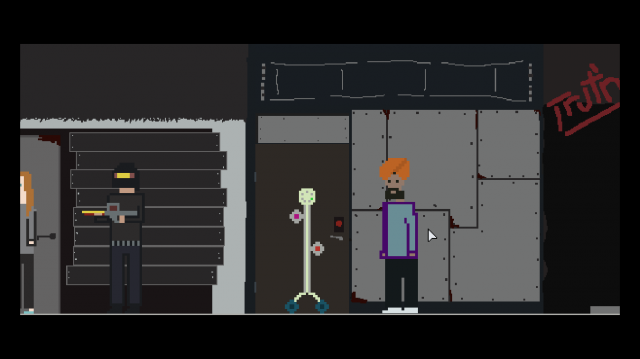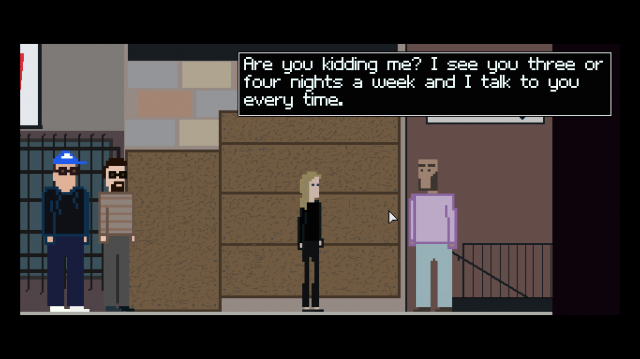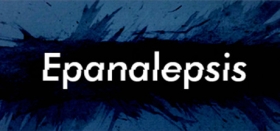
Epanalepsis Review
I confess that ‘auteur cinema’ (an indie trend where film reflects a director’s personality) is way beyond my grasp, and alongside it, a great deal of contemporary art. Not all of it, however; I’ve only got so much knowledge of metaphorical language — which I still consider quite extensive. Still, the surrealist and abstract representations lie outside my understanding when it becomes too esoteric, which makes Epanalepsis quite an arduous experience. This game is utterly obtuse regarding its overarching narrative; after three completions of the campaign, I feel no closer to understanding what the game was about. The language used, the mixed of themes and references, the abstractness of the concepts and the brevity of the game establish a tone that is a bit at odds with each individual story. Moreover, from the way the game is structured, it is impossible to not throw mild spoilers into this review, as the only persistent narrative, spanning the whole game, comes in doses that are implicitly presented as big revelations — which they’re not. Don’t worry; they will not ruin the game for you, though.
Epanalepsis is a narrative-focused game; or rather, a character-focused game. It’s divided in three chapters, with very contrasting characters in each of them. Each chapter is 20 years apart from the next one, while sharing the same location. The first one is led by Rachel, taking place in the 1990s; the second one is about Anthony, in the 2010s; and lastly, in the 2030s, you control a robot working in a cryo-sleep laboratory. Each individual narrative is tied up through two omnipresent time-travellers, Cascabel and Pasus. While it’s clear that this is their purpose when it comes to the game’s design, I’m still scratching my head regarding their meaning outside linking the three stories together.
 There surely must be a reason why they turn up to every controllable character, who have little in common with each other. Unfortunately, after reading three times what every character had to say, I cannot comprehend their mission, this due to the main reason for this being the obtuse language spoken by these two. They refer to themselves and their goal in a way that implies they’ve been tasked with recruiting — for lack of better word — the main characters, but not really, because they never actually try that. They seem to introduce themselves as enlightening entities to these characters, mentioning sci-fi entities or phenomena that are never later explained. They turn up, they drop a few incomprehensible lines and they leave the way they came. Indeed, rhetoric can be useful in many cases, enhancing the emotional load of the piece, but if it flies too high over one’s head, it becomes counter-productive.
There surely must be a reason why they turn up to every controllable character, who have little in common with each other. Unfortunately, after reading three times what every character had to say, I cannot comprehend their mission, this due to the main reason for this being the obtuse language spoken by these two. They refer to themselves and their goal in a way that implies they’ve been tasked with recruiting — for lack of better word — the main characters, but not really, because they never actually try that. They seem to introduce themselves as enlightening entities to these characters, mentioning sci-fi entities or phenomena that are never later explained. They turn up, they drop a few incomprehensible lines and they leave the way they came. Indeed, rhetoric can be useful in many cases, enhancing the emotional load of the piece, but if it flies too high over one’s head, it becomes counter-productive.
Epanalepsis works better when we look at each story individually, and compare them with one another. There is an ongoing contrast of themes, tone and visuals among chapters, which is actually more effective in relating a story than the narrative I mentioned in the paragraph above. In fact, each individual chapter, with all its overt quirks of the protagonists and the attention to the detail in the environment and the characters’ remarks, works perfectly on its own. I understand that the game needed a link among chapters, but given the narrative thread used, it might as well not be there. The overarching story does provide a way to tie up all chapters — albeit clumsy — but the dissonance between these chapters and the sci-fi overall story is too blatant to make any sense.
 The first chapter, where we find Rachel in a path of self-destruction as a way to get over her drug-dealer ex-girlfriend Vanessa, is the most polished one. The tone that she sets, quite languid and devil-may-care, is contrasted to Anthony’s pretentious and allegedly refined taste in music, videogames and even food, to the point that the sarcastic undertone becomes too obvious in the second chapter. The overly ordinary nature of their chapters make the game feel like a commentary of Rachel and Anthony’s personalities, pop culture, urban youth and even videogames. It is more heavily explored during Rachel’s part, with more detailed explanations of a larger number of objects. Although this attention to detail to the background objects is still present throughout the other two episodes, it seems as if the developers were more focused on the story related by Pasus and Cascabel, which is, ironically, much less likely to stick with you. Lastly, in the final chapter, you control a robot that looks after a cryo-sleep facility — where there apparently are indie devs in each chamber.
The first chapter, where we find Rachel in a path of self-destruction as a way to get over her drug-dealer ex-girlfriend Vanessa, is the most polished one. The tone that she sets, quite languid and devil-may-care, is contrasted to Anthony’s pretentious and allegedly refined taste in music, videogames and even food, to the point that the sarcastic undertone becomes too obvious in the second chapter. The overly ordinary nature of their chapters make the game feel like a commentary of Rachel and Anthony’s personalities, pop culture, urban youth and even videogames. It is more heavily explored during Rachel’s part, with more detailed explanations of a larger number of objects. Although this attention to detail to the background objects is still present throughout the other two episodes, it seems as if the developers were more focused on the story related by Pasus and Cascabel, which is, ironically, much less likely to stick with you. Lastly, in the final chapter, you control a robot that looks after a cryo-sleep facility — where there apparently are indie devs in each chamber.
The big problem with the mechanics among chapters is the lack of variety. You’re playing these massively distinct characters, with great differences in tone and theme, but the gameplay is limited to walk from one end to the level to the other, occasionally clicking on objects if required. The game feels half done in this regard, as if these contrasts needed to be expressed through the mechanics too. This recurrence of mechanics seems to be taken over to the visuals, with a blunt faux 8-bit art style, that although does the job, still feels dull and incomplete.
 All in all, despite having quite an emotional and fitting soundtrack, the abstractness of Epanalepsis’s message renders it too esoteric and (yes, I will say it) pretentious. As I’ve said, Epanalepsis works better when it’s focusing on individual narratives, as the grand scheme of things turns out blurry and confusing. Sadly, it progressively stops focusing on the details that make the first chapter mildly enjoyable, as if the final idea of the game had turned out different than how it started.
All in all, despite having quite an emotional and fitting soundtrack, the abstractness of Epanalepsis’s message renders it too esoteric and (yes, I will say it) pretentious. As I’ve said, Epanalepsis works better when it’s focusing on individual narratives, as the grand scheme of things turns out blurry and confusing. Sadly, it progressively stops focusing on the details that make the first chapter mildly enjoyable, as if the final idea of the game had turned out different than how it started.
Epanalepsis (Reviewed on Windows)
The game is unenjoyable, but it works.
Despite having quite an emotional and fitting soundtrack, the abstractness of Epanalepsis’s message renders it too esoteric and (yes, I will say it) pretentious. As I’ve said, Epanalepsis works better when it’s focusing on individual narratives, as the grand scheme of things turns out blurry and confusing.










COMMENTS